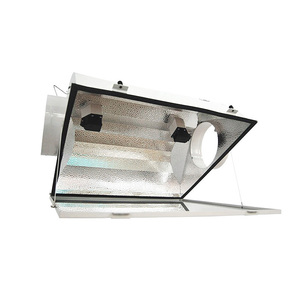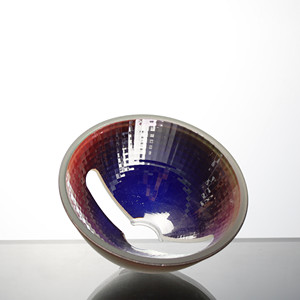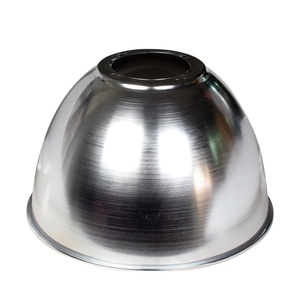(31602 products available)




























































































































































































An aluminum reflector is a component used in various lighting applications, particularly in LED and halogen lights. It is designed to reflect light in a specific direction to enhance illumination and improve energy efficiency. The aluminum reflector is lightweight, durable, and has high thermal conductivity, making it an ideal choice for use in high-temperature environments. Different types of aluminum reflectors include:
Parabolic Reflector
A parabolic reflector is an aluminum light reflector with a shape that resembles a parabola. It is used to focus light or energy onto a single point. This type of reflector is widely used in applications like solar energy collection and vehicle headlights, where focused light is required. Its ability to direct light with minimal loss makes it a popular choice in energy-efficient applications.
Conical Reflector
A conical reflector has a cone-shaped design. The design allows it to evenly distribute light in a circular pattern. This reflector is suitable for applications where uniform lighting is needed, such as streetlights and some types of recessed lighting fixtures. Its consistent light distribution makes it a reliable choice for areas that require continuous illumination.
Elliptical Reflector
These reflectors focus light on two focal points. They are primarily used in applications such as track lighting and some types of pendant lights. The elliptical shape allows for versatile light distribution, making it suitable for various architectural and theatrical lighting designs.
Deep Drawn Reflector
Deep-drawn reflectors are created through a deep-drawing process that forms complex shapes from flat aluminum sheets. This type of reflector can have various shapes, including parabolic or ellipsoidal. They are commonly used in industrial lighting and high-intensity applications due to their robustness and excellent light distribution.
Faceted Reflector
Faceted reflectors have a surface divided into small flat sections or facets. Each facet acts like a mini-reflector, directing light. This type of reflector is typically used in decorative lighting and some types of stage lighting. The faceted design can create unique lighting effects, making it suitable for applications that require visual appeal.
LED Reflector
These reflectors are specifically designed for use with LED lights. Aluminum reflectors for LEDs are usually cup-shaped to maximize the efficiency of light output. They help in directing the intense and focused light produced by LEDs. The design minimizes light dispersion, thus enhancing the overall efficiency of the lighting system.
The following are the features of aluminum light reflectors:
High reflectivity - Aluminum light reflectors are known to have a high reflectivity level. This means that any light directed toward them is reflected efficiently. High reflectivity ensures that lights are brightened and that the lights directed to the target area are increased.
Lightweight - Aluminum reflectors are usually lightweight. This makes them easy to handle, and they can be mounted in various applications without any complications.
Corrosion resistance - Aluminum has a unique ability to resist any form of damage caused by environmental elements. This allows the aluminum reflector to stay in good condition for a long time while maintaining its efficiency.
Versatility - Aluminum reflectors are used in various applications. They can be used in outdoor and indoor lighting systems. They are also used in light fixtures, solar panels, and various electronic devices that produce light.
Design flexibility - Aluminum is a malleable material. This allows it to be developed into various designs to meet a wide range of applications and requirements.
Cost-effective - Compared to other materials, aluminum is cheaper. This makes aluminum reflectors cost-friendly without compromising quality.
The following are the functions of aluminum light reflectors:
Enhancing light output - The main function of a light reflector is to enhance light output. The reflector helps to direct and focus light emitted in different directions to produce a beam of light. This increases the overall efficiency of the light.
Light control - Aluminum reflectors can control and direct light to a specific target area. This is because they can shape and focus the beam of light. Properly directing light helps to minimize light loss and waste. This makes them more energy efficient.
Glare reduction - These reflectors help to reduce glare by controlling the direction of light. This makes the light more comfortable to the eyes.
Aluminum reflectors have diverse applications across various industries and sectors due to their ability to efficiently reflect light. Here are some common usage scenarios:
Lighting Fixtures
Aluminum reflectors are widely used in lighting fixtures. They enhance the brightness and focus of light sources such as; LED lights, Halogen lights and Fluorescent lamps. Here, the reflectors can direct light in desired angles, thus improving illumination efficiency in applications like; street lighting, stadium lighting and automotive headlights.
Solar Energy Systems
Reflectors are integral components of solar energy systems. For instance, Concentrated Solar Power (CSP) plants and solar cookers. The reflectors focus sunlight onto solar panels or collectors, thus increasing the energy conversion efficiency. This leads to more sustainable and cost-effective solar power generation.
Projectors and Imaging Devices
In projectors and other imaging devices, aluminum reflectors are used to direct and focus light from the source (like bulbs or LEDs) onto the image to be projected. This ensures bright and clear projections in applications such as; data presentation in corporate settings and home theater systems.
Flashlights and Headlamps
Aluminum reflectors are used in the interior of flashlight and headlamp casings. This helps to efficiently direct and focus the beam of light emitted from the source. This ensures a bright and concentrated light output for illumination in dark areas or during emergency situations.
High-Intensity Discharge (HID) Lighting
HID lighting systems, commonly used in stadiums, streetlights and automotive headlights, rely on aluminum reflectors to maximize light output. The reflectors improve the efficiency and visibility of these lighting applications.
Grow Lights for Indoor Plant Cultivation
In indoor gardening and hydroponic systems, aluminum reflectors are used to enhance the efficiency of grow lights. They ensure that plants receive adequate light for growth and development by directing light where it is needed.
Architectural Lighting
In architectural lighting design, aluminum reflectors are used to create specific lighting effects and highlight features of buildings and landscapes. The reflectors can provide elegance and enhance aesthetics of outdoor and indoor spaces.
Refrigeration and HVAC Systems
Aluminum reflectors are utilized in some refrigeration and HVAC systems to improve the distribution and efficiency of cooled or heated air. This ensures more consistent temperatures in refrigerated containers and other spaces.
When choosing an aluminum reflector for sale, buyers should consider several factors to ensure they stock a product that meets the needs of their customers. Here are some of the factors buyers should consider:
Application
Buyers should look for aluminum reflectors that are suitable for various applications such as floodlights, automotive lights, and led lighting. This will ensure they have a product that meets the needs of their customers.
Design
Buyers should look for aluminum reflectors with different designs such as ellipsoidal, parabolic and spherical. This will give their customers options to choose from that will work well depending on their light source.
Size
Buyers should look for aluminum reflectors in different sizes suitable for various lighting fixtures. This will ensure they have a product that will meet the needs of various business customers' dealers who are looking for reflectors that are compatible with their existing setups.
Coating
To ensure durability and enhanced performance, buyers should look for aluminum reflectors with a protective coating. The coating will protect the reflectors from corrosion and maintain their reflectivity over time.
Efficiency
To ensure maximum light output, buyers should look for aluminum reflectors with high reflectivity. The reflectors should be able to minimize light loss through absorption.
Heat Dissipation
Buyers should look for aluminum reflectors designed to dissipate heat effectively. Such reflectors will help extend the lifespan of the lighting fixtures.
Customization
Reliable aluminum reflector suppliers offer custom aluminum reflector options. Buyers should settle for such suppliers to get reflectors that are tailored to specific requirements such as specific dimensions and coating requirements.
Q1: What are the most common defects in an aluminum reflector?
A1: The most common defects include scratches, dents, and uneven surfaces. Scratches can occur during handling or installation, while dents may result from impacts or بالمثل. Uneven surfaces can be a manufacturing defect or caused by external factors. It's essential to inspect the reflector thoroughly before purchase to ensure it's in good condition.
Q2: What's the typical lifespan of an aluminum reflector?
A2: The lifespan of an aluminum reflector depends on several factors, including the quality of the material, the type of coating used, and the operating conditions. A well-manufactured reflector can last up to 10 years or more. However, exposure to harsh chemicals or extreme temperatures can shorten its lifespan.
Q3: Can aluminum reflectors be repaired if damaged?
A3: Minor damage, such as small dents or scratches, can be repaired. Professional technicians have the right tools and skills to remove dents and polish out scratches. However, deep dents or cracks may render the reflector irreparable. It's best to consult a professional for assessment and possible repairs.
Q4: How can one choose the right size aluminum reflector for their needs?
A4: To choose the right size aluminum reflector, consider the lighting fixture's size and the intended application. Reflectors come in different sizes and shapes to suit various lighting fixtures. Measure the diameter and depth of the lighting fixture's opening and match it with the reflector's specifications.
Q5: Are there any safety precautions when handling aluminum reflectors?
A5: Yes, there are safety precautions when handling aluminum reflectors. First, wear cut-resistant gloves to prevent injuries from sharp edges. Use proper lifting techniques or equipment to avoid straining yourself, especially with large reflectors. Additionally, avoid placing heavy objects on the reflector to prevent dents or breaks.